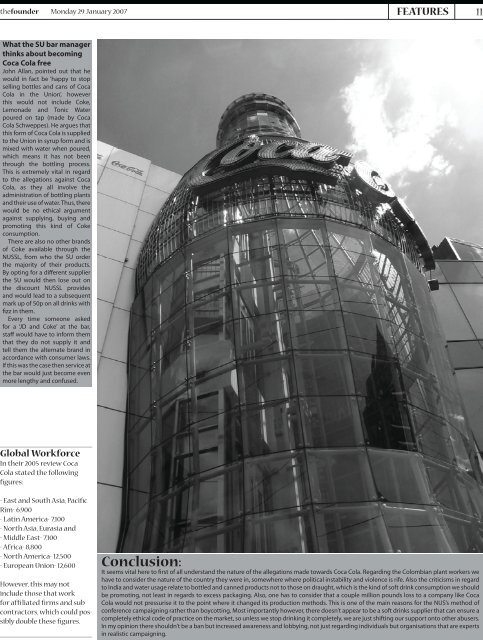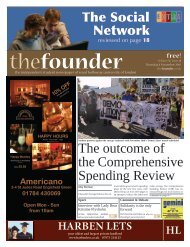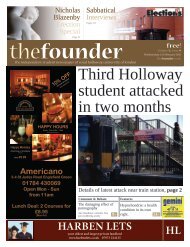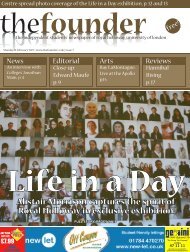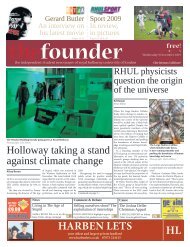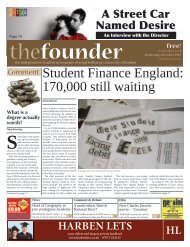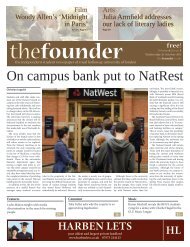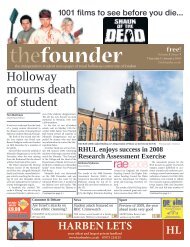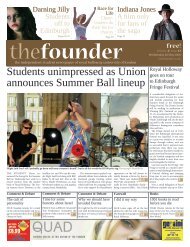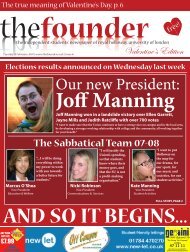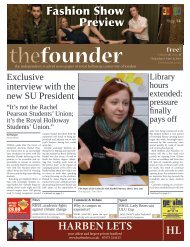GM FORECASTS RADICAL CHANGE - The Founder
GM FORECASTS RADICAL CHANGE - The Founder
GM FORECASTS RADICAL CHANGE - The Founder
You also want an ePaper? Increase the reach of your titles
YUMPU automatically turns print PDFs into web optimized ePapers that Google loves.
thefounder Monday 29 January 2007<br />
FEATURES<br />
11<br />
What the SU bar manager<br />
thinks about becoming<br />
Coca Cola free<br />
John Allan, pointed out that he<br />
would in fact be ‘happy to stop<br />
selling bottles and cans of Coca<br />
Cola in the Union’, however<br />
this would not include Coke,<br />
Lemonade and Tonic Water<br />
poured on tap (made by Coca<br />
Cola Schweppes). He argues that<br />
this form of Coca Cola is supplied<br />
to the Union in syrup form and is<br />
mixed with water when poured,<br />
which means it has not been<br />
through the bottling process.<br />
This is extremely vital in regard<br />
to the allegations against Coca<br />
Cola, as they all involve the<br />
administration of bottling plants<br />
and their use of water. Thus, there<br />
would be no ethical argument<br />
against supplying, buying and<br />
promoting this kind of Coke<br />
consumption.<br />
<strong>The</strong>re are also no other brands<br />
of Coke available through the<br />
NUSSL, from who the SU order<br />
the majority of their products.<br />
By opting for a different supplier<br />
the SU would then lose out on<br />
the discount NUSSL provides<br />
and would lead to a subsequent<br />
mark up of 50p on all drinks with<br />
fizz in them.<br />
Every time someone asked<br />
for a ‘JD and Coke’ at the bar,<br />
staff would have to inform them<br />
that they do not supply it and<br />
tell them the alternate brand in<br />
accordance with consumer laws.<br />
If this was the case then service at<br />
the bar would just become even<br />
more lengthy and confused.<br />
Global Workforce<br />
In their 2005 review Coca<br />
Cola stated the following<br />
figures:<br />
- East and South Asia, Pacific<br />
Rim- 6,900<br />
- Latin America- 7,100<br />
- North Asia, Eurasia and<br />
- Middle East- 7,100<br />
- Africa- 8,800<br />
- North America- 12,500<br />
- European Union- 12,600<br />
However, this may not<br />
include those that work<br />
for affiliated firms and sub<br />
contractors, which could possibly<br />
double these figures.<br />
Conclusion:<br />
It seems vital here to first of all understand the nature of the allegations made towards Coca Cola. Regarding the Colombian plant workers we<br />
have to consider the nature of the country they were in, somewhere where political instability and violence is rife. Also the criticisms in regard<br />
to India and water usage relate to bottled and canned products not to those on draught, which is the kind of soft drink consumption we should<br />
be promoting, not least in regards to excess packaging. Also, one has to consider that a couple million pounds loss to a company like Coca<br />
Cola would not pressurise it to the point where it changed its production methods. This is one of the main reasons for the NUS’s method of<br />
conference campaigning rather than boycotting. Most importantly however, there doesn’t appear to be a soft drinks supplier that can ensure a<br />
completely ethical code of practice on the market, so unless we stop drinking it completely, we are just shifting our support onto other abusers.<br />
In my opinion there shouldn’t be a ban but increased awareness and lobbying, not just regarding individuals but organisations that are experts<br />
in realistic campaigning.


